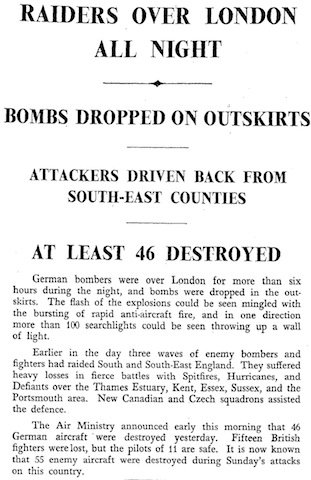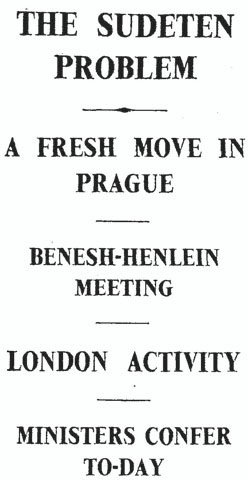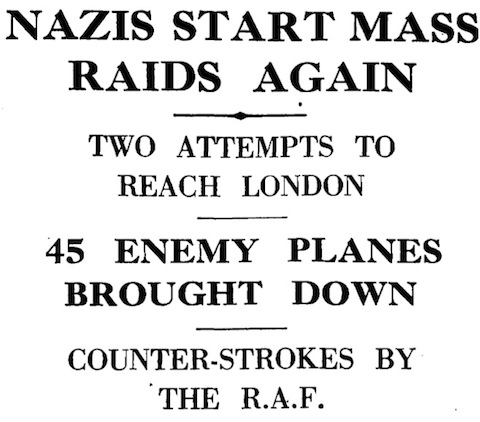
Today we're reading The Times. London was again menaced by German bombers last night, though it seems bombs fell only on the 'outskirts' (4), in particular 'one bomb' hit 'a building in the outskirts of London'. Folkestone was much harder hit by a daytime raid in which 'German bombers swooped out of the sun [...] people saw the bombs leaving the racks as the raiders dived to within a few hundred feet of the roof tops'. Three people were killed, laundry workers all. British fighters chased the bombers ('believed to be Messerschmitt Jaguar bomber-fighters') out over the Channel, claiming three.
There are many such tragedies reported on the same page from the weekend's raids as details filter out, deaths dealt with in a sentence or two. A family in a 'south-east port' killed when a bomb hit their Anderson shelter; a family of six in the Midlands likewise were killed, but in their cellar; two policemen in London; several children wounded and a girl killed 'by a bullet through the back of the neck' when German aircraft machine-gunned a Scilly beach. (It can also now be revealed (2) that the church damaged during Saturday's attack on the City was St Giles, Cripplegate, 'in which Oliver Cromwell was married and John Milton was buried'. Apparently the damage isn't as bad as first thought, though the inside sounds like a mess.)
Still, despite the natural anger that such accounts might make the reader feel, The Times's aeronautical correspondent cautions (4) that
It should not be imagined for a moment that Sunday night's raids on the outskirts of Berlin were intended as a "tit-for-tat" reprisal for the indiscriminate bombing of London during the week-end. Whereas the German aircraft jettisoned their bombs with little or no regard for direction or what they were going to hit, the R.A.F. raids were directed against definite military objectives, which had been singled out for attack some time before.
Having said that, he does admit that Berlin 'may, of course, have been brought to the top of the programme as a result of the London raids', but the objectives inside Berlin would have been the same whether London had been attacked or not. So that's clear then.
Instead of (or actually, as well as) reprisals against German cities, readers of The Times get thrilling accounts of German invaders being intercepted and shot down. For example, a Canadian squadron joined the fray yesterday:
The new squadron of Canadian pilots, with their Canadian-built Hurricanes, also took in this second fight. Like the Czechs, they met a formation of Dornier bombers above the clouds. After their attack they saw the crew bale out of one Dornier. Another dived out of control through the clouds below. A Hurricane pilot of another squadron watched his second victim, an Me.109 bomber, drop into the cloud with cowling shot away and cooling mixture pouring out. His last glimpse was of the German pilot climbing out of the cockpit.
With accounts like this in the press every day -- not to mention Churchill's speech last week lauding 'the few' -- it's no wonder that the RAF's pilots are becoming idolised by the public. A letter from H. P. Drewry of Barton-on-Sea (5) calls them 'a type of young men whose deeds will become as legendary as those of their forebears in the great Elizabethan days'. But Drewry worries that when the war is over (and, presumably, won) these heroes will be forgotten and thrown onto the scrapheap, repeating 'the post-war errors of the last War'.
Let us show our gratitude in some tangible form [...] to insist that a percentage, and I hope, a very large percentage, of posts in the sheltered industries and professions be reserved for these young men. Our large and evergrowing Civil Service could absorb a great many, and, in these days of changing values, the qualities of vision, energy, ability, and courage possessed by our airmen would not need to be demobilized in their post-war Government employment.
War can bring out the best in people, as with 'the Few' and H. P. Drewry's idealism. But then there are those (9) like Arthur Glade of Ilford, 35, who was sentenced to six months' hard labour for soliciting subscriptions for fake war funds -- 'The Fighting Services Aids' Association' and 'The Public War Aids Aircraft Purchasing Fund' (president: Mr. Winston Churchill) -- and John Falzon, 20, a waiter from St Pancras, who was remanded for looting 'a woollen undervest and a lady's leather handbag, of the total value of 5s. 6d.' from a smashed City shopfront after Saturday night's raid. It's going to be a long war.
![]() This work is licensed under a Creative Commons Attribution-NonCommercial-NoDerivatives 4.0 International License.
Permissions beyond the scope of this license may be available at http://airminded.org/copyright/.
This work is licensed under a Creative Commons Attribution-NonCommercial-NoDerivatives 4.0 International License.
Permissions beyond the scope of this license may be available at http://airminded.org/copyright/.




